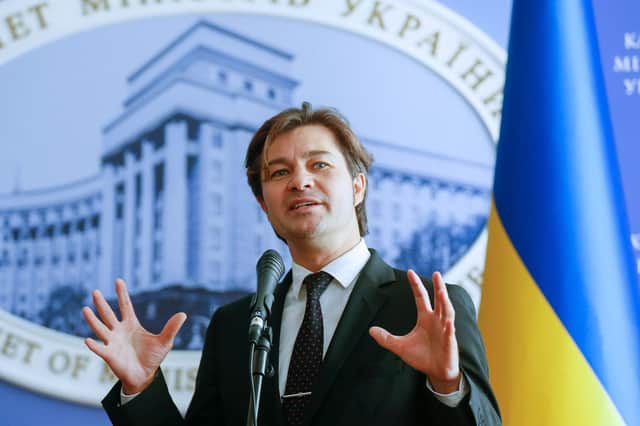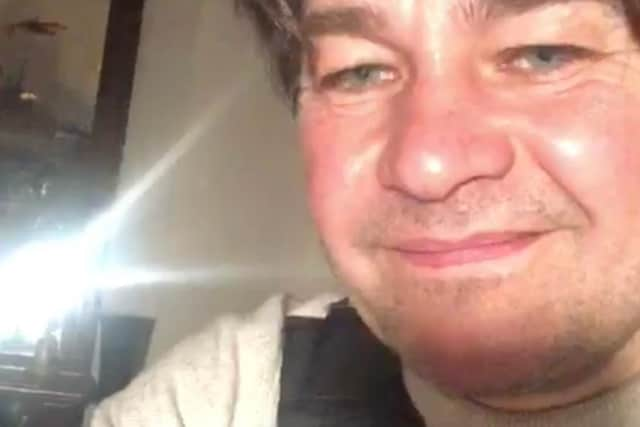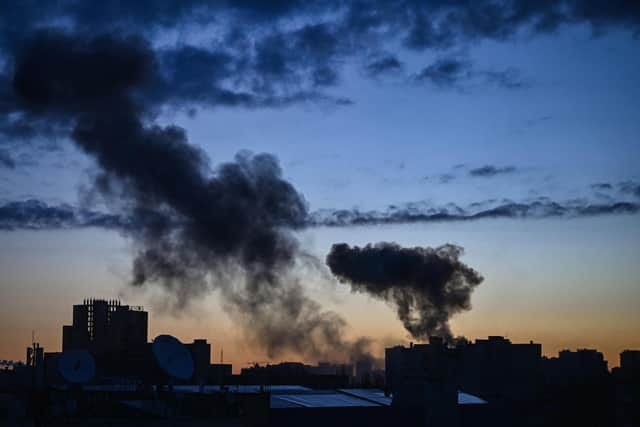'Ukraine will survive' – actor Yevhen Nyshchuk looks to the future


Yevhen Nyshchuk is sitting backstage at the Suzirya Theatre in Kyiv, wearing a bulletproof vest. As an actor, he knows the place well; and back in 2016, as culture minister in the pro-western Ukrainian government that came to power after the Maidan revolution of 2014, he was the man who came down to the nearby National Academic Children’s Theatre, also in central Kyiv, to take part in a Traverse Theatre Class Act project designed by the playwright Nicola McCartney, from Scotland, and her colleague Natalia Vorozhbyt, from Ukraine, to bring together young people from the western and eastern regions of Ukraine, increasingly divided by the war in the east – launched with Russian support in 2014 – which eventually became the pretext for the current invasion.
Nyshchuk wanted to show his support for the project because its efforts to encourage children from both sides of the conflict to work together had begun to attract criticism on social media; and given the design of the Class Act project, which involves young people writing short plays which are then performed by professional actors, Nyshchuk was able to volunteer to play the role of the father in one of the plays, greatly increasingly public and media interest in the project.
Advertisement
Hide AdThat, though, was in a different life, before the invasion of 24 February; and now, Nyshchuk tells me, he is serving in one of more than 100 territorial defence militias who are trying to defend the Kyiv region from Russian attack. He has been, just this morning, to visit towns on the outskirts of Kyiv – including Irpin and Bucha – which have suffered shocking casualties and material damage in the recent Russian bombardment, and he seems shocked and saddened by what he has seen; but like most Ukrainians, he also seems absolutely resolute in his belief that the invasion will be resisted, and that Ukraine will survive as an independent country.


“Most of our theatre companies in Kyiv are focussed on the war now,” he says. “Generally speaking, the men have volunteered for territorial defence forces like the one in which I am fighting, and many of the women and children have left for safer parts of the country.”
“In terms of where we are militarily, I am certain the Russians cannot win a land war in Ukraine; the resistance is too strong, and their forces are weak and unmotivated. A lot of their military power on the ground is a kind of fake power, and I am confident we can defeat it easily. I have to say that in terms of the ground war, the actions of Britain and of Prime Minister Boris Johnson are very much appreciated, in terms of the arms they have provided; it was important for us, and we recognise all the help we have had from European and western powers in that respect.
“As everyone knows, though, the problem is Russia’s air power, and their ability to use missiles and bombs to inflict horrible damage on buildings – even schools and hospitals – and on civilian populations. That’s why we really ask our western friends to close the sky over Ukraine, and protect our people from these attacks, which are really war crimes. Or if they will not do it themselves, to give us the planes and hi-tech weapons that are necessary. So far as Vladimir Putin’s nuclear threats are concerned, I think they are really the scare stories of a mentally ill person. We suspect that Russia’s nuclear power, like much of its land power, is out of service; and we do not think the west should be frightened by this mythology of Russia’s great military power.”
Despite his intense focus on the military situation, Nyshchuk also strongly supports the other actions the west is taking against Russia, including economic sanctions, and sporting and cultural boycotts; I mention a strong statement supporting a boycott of Russian projects by literary translators sent to me by our interpreter, Dmytro Drozdovsky, on behalf of Vsevit magazine, which he edits, and he nods in approval.


“Obviously, these sanctions don’t affect the immediate military situation; and of course at the moment probably 70 per cent of the Russian population are believing Putin’s propaganda and supporting the war. But over time, when they begin to realise how many soldiers have been lost, and that something is going seriously wrong with Russian life because of the extent of the sanctions and the isolation they bring, I think they will really help to undermine the fake narrative the Russian government is pushing, and to bring the Putin regime to an end.”
Advertisement
Hide AdYevhen Nyshchuk’s transition into a military life has obviously been both abrupt and shocking; but in a sense, it represents the culmination of a journey that began almost 20 years ago, with the Orange Revolution of 2003-2004 that signalled the beginning of the end of pro-Moscow rule in Kyiv. Born in western Ukraine in 1972, and trained at Ukraine National University of Theatre, Film and TV in Kyiv, Nyshchuk graduated in 1995, and by 2003 was a well known young actor in theatre and film. During the Orange Revolution, centred on the legendary Maidan square in Kyiv, he became known as the “voice of Maidan”, often acting as master of ceremonies during the occupation of the square by young activists and demonstrators; and although he retreated from political life after 2004, to focus on his acting and film-making career, he once again felt compelled to take part when, in 2013, young people in Kyiv began to rise up against the pro-Moscow government of Viktor Yanukovych, who had been elected to the presidency in a bitterly fought election in 2010.
“When I saw the attacks by police on civilians that were happening in Maidan, and people even losing their lives, I felt I had to go down there again,” says Nyshchuk, who once again took on the role of compere and master of ceremonies on the main Maidan stage. “And when Yanukovich fled, in February 2014, I was in a way elected by the people in Maidan to be the next culture minister. So in a way, fate determined my life. I was making my way as a film and theatre artist, but I was also always very sensitive to the political events around me, and to the fact that we were working to build and establish a democratic country in Ukraine.”
Advertisement
Hide AdNyshchuk take some pride in his record as culture minister, a post which he held briefly during 2014, and then again from 2016 to 2019. During that time, he reformed the structure of support for the arts in Ukraine, setting up new cultural institutions and agencies – including new film agencies, and an institute for the study of the great Ukrainian famine of the 1930s, in which almost 4 million people died – designed to remain at arm’s length from ministerial influence and corruption; he says that he was much inspired by the EU’s Culture Europe programme during his time as minister, and that the reforming work done in Ukraine during 2014-2019 has been commended as a model for other European nations.
He also firmly denies the allegation, central to the current Russian political, narrative, that their intervention in Ukraine, and invasion the country, was necessary to prevent the pro-western government from persecuting Russian-speaking people in Ukraine, and seeking to obliterate Russian language and culture from the country. While a law has been passed requiring that people occupying official government posts in Ukraine should be able to work in Ukrainian, international agencies support Nyshchuk’s insistence that people in Ukraine are able to use whichever language they like, in almost all contexts.
He says that no theatre performing in Russian has ever been closed by the Ukrainian government; and recent reporting on the conflict Ukraine certainly seems to confirm that many Russian speakers, in cities such as Kharkiv and Mariupol, do not feel that their Russian language and culture makes them any less Ukrainian, or any less determined to defend their country. “That idea,” says Nychchuk, “that Russian speaking Ukrainians want to be part of Russia, is just another aspect of Russian mythology, and of the fake version of the world they are promoting.”
Finally, I ask Nyshchuk where he thinks he will be in a year’s time; and am surprised by the intensity and clarity of his answer. “I do not believe that the active military phase of this war will last for more than about a month,” he says. “After that, I believe it will become one of those frozen negative situations, with Russian forces still present in some areas. I do not even think they will succeed in cutting Ukraine off from the sea, in the south; they have not succeeded in taking Odesa, for example.
“So in a year’s time, I think we will be very focussed on the terrible damage Ukraine has suffered in this war, and on the process of rebuilding. We will need help in reconstructing all the beautiful towns and cities that have been damaged or destroyed, and in restoring our economy; and we will be remembering the name of every single hero who has died during this war. We are a very courageous people and a very responsible people, who love to work hard, and want to love our neighbours; and we will be here, working to build a county based on peace, democracy and dignity, no matter what.”
Then finally, just as our call is ending, it’s as if Nyshchuk's old life from before the war suddenly returns to him, and he starts to tell me about plays by Friedrich Durrenmatt and Erich Maria Remarque on which he was working, before 24 February. “I would love to bring them to the Edinburgh Festival one day,” he says; and I can only say yes, yes of course, as soon as the war is over – because that, after all, is how the Edinburgh Festival began, and how it seems fated to continue, in this troubled 21st century.
Advertisement
Hide AdWith thanks to Matthew Zajac of Dogstar Theatre for facilitating this interview, and to Dmytro Drozdovsky for acting as interpreter.
A message from the Editor:
Thank you for reading this article. We're more reliant on your support than ever as the shift in consumer habits brought about by coronavirus impacts our advertisers.
If you haven't already, please consider supporting our trusted, fact-checked journalism by taking out a digital subscription at https://www.scotsman.com/subscriptions